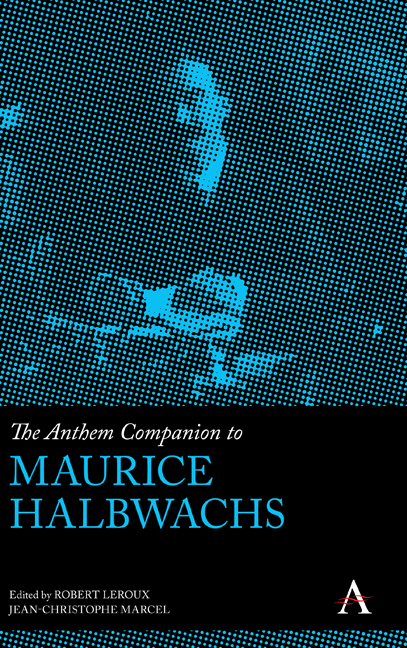Book contents
- Frontmatter
- Contents
- Introduction
- Chapter 1 A Theorist of Collective Memory
- Chapter 2 Halbwachs and the Durkheimian Perspective on History
- Chapter 3 Maurice Halbwachs, Sociologist of Memory: His Reception in Italy and the Development of the Sociology of Memory
- Chapter 4 Population as the Body of Society
- Chapter 5 Urban Morphology and Social Morphology: Marcel Roncayolo and the Work of Maurice Halbwachs
- Chapter 6 Halbwachs’s Leibniz and Halbwachs’s Sociology
- Chapter 7 Halbwachs on Quetelet and the Use of Statistics in Sociology
- Chapter 8 Maurice Halbwachs and the Sociology of Consumption and Social Classes
- Chapter 9 From Criticism of Moral to the Probalistic Test
- Chapter 10 The Age Criterion: Between Sociology and Biology
- Chapter 11 Speculation: Order or Disorder?
- List of Contributors
- Index
Chapter 1 - A Theorist of Collective Memory
Published online by Cambridge University Press: 23 February 2022
- Frontmatter
- Contents
- Introduction
- Chapter 1 A Theorist of Collective Memory
- Chapter 2 Halbwachs and the Durkheimian Perspective on History
- Chapter 3 Maurice Halbwachs, Sociologist of Memory: His Reception in Italy and the Development of the Sociology of Memory
- Chapter 4 Population as the Body of Society
- Chapter 5 Urban Morphology and Social Morphology: Marcel Roncayolo and the Work of Maurice Halbwachs
- Chapter 6 Halbwachs’s Leibniz and Halbwachs’s Sociology
- Chapter 7 Halbwachs on Quetelet and the Use of Statistics in Sociology
- Chapter 8 Maurice Halbwachs and the Sociology of Consumption and Social Classes
- Chapter 9 From Criticism of Moral to the Probalistic Test
- Chapter 10 The Age Criterion: Between Sociology and Biology
- Chapter 11 Speculation: Order or Disorder?
- List of Contributors
- Index
Summary
The expression ‘collective memory’ appears in the sociological literature since the first institutionalisation of the discipline in the late nineteenth century. At that time, the phrases ‘collective memory’ and ‘social memory’ were intertwined. For the French positivist Guillaume De Greef, history was the ‘recording organ of the collective memory’ from which religions drew their social functions (De Greef 1893, ch. 1). In Chicago, a few years later, it was precisely this aggregative function of human experience that drew the attention of the sociologist George Edgar Vincent: ‘At any given moment the traditions of a society, economic, legal, religious, scientific, artistic, and political, may be thought of as social products forming in the aggregate the social memory’ (Vincent 1897, 15). Vincent was aware of Durkheim, but he shaped his idea from De Greef 's ‘social transformism’ (De Greef 1895, 9) and justified it by means of Gabriel Tarde's theory of imitation. It is where we meet the term ‘social memory’: ‘Imitation corresponds exactly to memory; in effect it is in the form of social memory, which is essential to every action, necessary at any given moment of social life, that memory constantly and essentially operates in the mind’ (Tarde 1895, 123). By drawing together strands from De Greef, Durkheim and Tarde, Vincent demonstrated an eclecticism that would have left his continental homologues perplexed. The wide range of analyses on the topic for the last decades troubles today this earlier background of Maurice Halbwachs's systematic work for conceptualisation between the 1920s and 1940s. He was indeed a philosopher who, as one among Bergson's (1896) careful readers, strictly developed the Durkheimian method on the topic, following his sociological master and homologue (Durkheim, 1898, or Mauss and Durkheim, 1903). Of course, the international reception came more recently: with Google Books, in French, Mémoire collective; in English, Collective Memory; and in German, kollektives Gedachtnis, among books of any kind published during the two last centuries and recently digitalised: the phrases are appearing a little more frequently around 1960 and their presences are boosted during the last two decades of the twentieth century.
- Type
- Chapter
- Information
- The Anthem Companion to Maurice Halbwachs , pp. 5 - 16Publisher: Anthem PressPrint publication year: 2021



